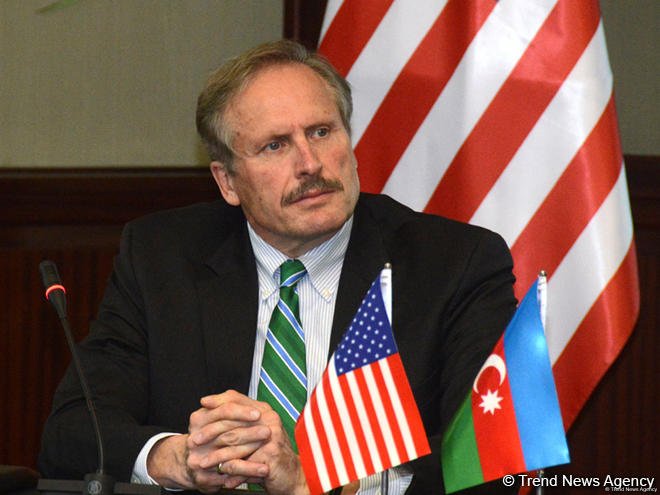BAKU, Azerbaijan, November 15. The Trans Adriatic Pipeline (TAP) has made immense contributions to Europe’s energy security, former ambassador of the US to Azerbaijan Robert F. Cekuta told Trend, as TAP marks 5 years since the start of commercial operation.
"European and global developments, especially from February,
2022 onwards, have more than validated the reasons why governments
and energy companies came together to design and build TAP and the
Southern Gas Corridor. The contributions TAP and the other
components of the SGC have made — and continue to make — to energy
security have been immense, whether measured in terms of consumers’
continued ability to get the gas they need for their homes and
businesses or the energy and national security of Italy, Albania,
and the other countries TAP and the SGC serve," he said.
Cekuta pointed out that Azerbaijan’s role as a reliable energy
partner for Europe through TAP is great.
"Azerbaijan’s predictable supplies of gas and crude oil are
important contributions to global energy needs. While this is a
longstanding reality, it has become especially important in the
last few years as the EU, its member countries, and others in
Europe and elsewhere have looked for alternative sources to
supplies that come from Russia, Iran, and others due to actions
Moscow, Tehran, and some other governments that have taken that
undercut international peace and security," he said.
Cekuta went on to add that energy markets are dynamic and the
overall global energy space is experiencing any number of changes,
whether in terms of new energy sources, other new technologies,
evolution of global markets, and the need to address climate change
while at the same time providing the energy individual consumers
and companies need.
"Energy remains what it has been since our forebears first
discovered fire: basic to human life. But how we get that needed
energy is something that is dynamically evolving," he said.
The former ambassador believes that the governments and companies
involved in TAP, whether as customers, suppliers, or operators need
to keep on top of these developments, looking at where energy
demand trends are going and thinking of how best to adjust — and
adjust in a timely manner — to meet those evolving needs.
"Along those lines, one thing I would particularly note is the
growing supplies of liquified natural gas (LNG), particularly from
the United States and Qatar, and how they are affecting future
development of delivery of natural pipelines. Both types of gas —
gas delivered via pipelines and LNG — are going to continue to be
essential for countries in Europe and elsewhere, but I think this
question of how the two systems for meeting global gas customers’
needs intersect and develop is something that the operators of TAP,
and operators of other pipeline networks, are going to have to
consider," he concluded.
On November 15, 2020, four and a half years after the inauguration of construction works, the 878-km gas transportation system crossing Greece, Albania, the Adriatic Sea and Italy, began commercial operations. On December 31, 2020 TAP started transporting first gas. TAP’s annual capacity is 10 billion cubic meters with the possibility of expansion to 20 billion cubic meters.
The increase of TAP supplies by an additional 1.2 billion cubic meters by 2026 was approved in January 2024. Work is currently underway to organize gas supplies to Albania via TAP starting in 2026.







